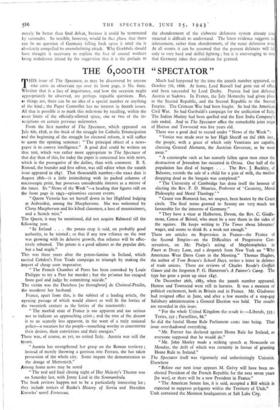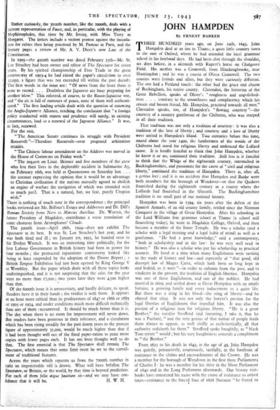THE 6,000TH " SPECTATOR"
THIS issue of The Spectator, as may be discovered by anyone who casts an obiervant eye over its front page, is No. 6000. Whether that is a fact of importance, and how the occasion might appropriately be observed, are perhaps arguable questions. But, as things are, there can be no idea of a special number or anything of the kind ; the Paper Controller has no interest in 6000th issues. All that is possible is to mark this milestone by recalling, within the strait limits of the officially-allotted space, one or two of the in- scriptions on certain previous milestones.
From the first number of The Spectator, which appeared on July 6th, 1828, in the thick of the struggle for Catholic Emancipation and the beginning of the struggle for electoral reform, it will suffice to quote the opening sentence: " The principal object of a news- paper is to convey intelligence." A good deal could be written on that text, which was rather more appropriate to The Spectator of that day than of this, for today the paper is concerned less with news, which is the prerogative of the dailies, than with comment. R. S. Rintoul, the founder and first editor, was still editor when the r000th issue appeared in 1847. That thousandth number—the exact date is August 28th—is a little intimidating with its packed columns of microscopic print, but possesses considerable interest as a mirror of the times. Its " News of the Week "—a heading that figures still on the front page in 1943—epitomises current events.
" Queen Victoria has set herself down in her Highland lodging at Ardverikie, among the Macphersons. She was welcomed by Cluny Macpherson and his kilted clansmen, a host of mountaineers, and a Scotch mist."
The Queen, it may be mentioned, did not acquire Balmoral till the following year.
" In Ireland . . . the potato crop is said, on probably good authority, to be tainted ; so that if any new reliance on the root was growing with its delusive growth, that reliance will be effec- tively rebutted. The potato is a good adjunct to the popular diet, but a bad staple."
This was three years after the potato-famine in Ireland, which carried Cobden's Free Trade campaign to triumph by making the import of cheap corn imperative.
" The French Chamber of Peers has been convoked by Louis Philippe to try a Peer for murder ; but the prisoner has escaped from gaol and judge by committing suicide."
The victim was the Dutchess [so throughout] de Choiseul-Praslin, the murderer her husband.
France, apart from this, is the subject of a leading article, the opening passage of which would almost as well fit the forties of the twentieth century as the forties of the nineteenth: " The morbid state of France is too apparent and too serious not to indicate an approaching crisis ; and the root of the disease is to us scarcely less apparent, in the want of a truly national policy—a vocation for the people—something worthy to concentrate their desires, their convictions and their energies."
There was, of course, as yet, no united Italy. Austria was still the tyrant.
" Austria has strengthened her grasp on the Roman territory ; instead of merely throwing a garrison into Ferrara, she has taken possession of the whole city. Some impute the demonstration to the dotage of Metternich."
Among home news may be noted
" The real and final closing night of Her Majesty's Theatre was on Saturday last, with Jenny Lind in the Somnambula.
The book reviews happen not to be a particularly interesting lot ; they include notices of Ranke's History of Servia and Sheridan Knowles' novel Fortescue. Much had happened by the time the 2000th number appeared, on October 7th, 1866. At home, Lord Russell had gone out of office and been succeeded by Lord Derby. Prussia had just defeated Austria at Sadowa. In France, the July Monarchy had given place to the Second Republic, and the Second Republic to the Second Empire. The Crimean War had been fought. So had the American Civil War. So had Garibaldi's campaign for the unification of Italy. The Indian Mutiny had been quelled and the East India Company's rule ended. And in The Spectator office the remarkable joint reign of Hutton and Townsend was five years old.
There was a good deal to record under " News of the Week ": " Venice was made over to her High Sheriff on the 18th inst., the people, with a grace of which only Venetians are capable, cheering General Alemann, the Austrian Governor, as he went away."
" A catastrophe such as has scarcely fallen upon men since the destruction of Jerusalem has occurred in Orissa. One half of the population has died of hunger. . . . The Rev. J. Buckley, of Balasore, records the sale of a child for a pint of milk, the mother dropping dead as the bargain was completed."
" The University of Cambridge has done itself the honour of electing the Rev. F. D. Maurice, Professor of ' Casuistry, Moral Philosophy and Moral Theology.' " " Count von Bismarck has, we suspect, been beaten by the Court circle. The final terms granted to Saxony are very much too favourable for the interests of Germany."
" They have a vicar at Halberton, Devon, the Rev. C. Girdle- stone, Canon of Bristol, who must be a sore thorn in the sides of the squires. He keeps writing to The Times about labourers' wages, and seems to think 8s. a week not enough."
There are articles on Repression in France—the France of the Second Empire—on the Difficulties of Progressive Con- servatives, on Mr. Phelps's acting of Mephistopheles in Faust at Drury Lane, and a despatch from New York on " Why Americans Wear Dress Coats in the Morning." Thomas Hughes, the author of Tom Brown's School Days, writes a letter in defence of trade unions. There are reviews of Charles Reade's Griffith Gaunt and the forgotten P. G. Hamerton's A Painter's Camp. The type has gone a point up since 1847.
On December 26th, 1885, when the 3000th number appeared, Hutton and Townsend were still in harness. It was a moment of political excitement, both in Britain and in France. Mr. Gladstone had resigned office in June, and after a few months of a stop-gap Salisbury administration a General Election was held. The results are recorded in this issue.
" For the whole United Kingdom the result is : —Liberals, 333 ; Tories, 251 ; Parnellites, 86."
So did the fateful Home Rule Parliament come into being. That issue overshadowed everything.
" Mr. Forster has declared against Home Rule for Ireland, as everyone supposed that he would do."
" Mr. John Morley made a striking speech at Newcastle on Monday, the drift of which was certainly in favour of granting Home Rule to Ireland."
The Spectator itself was vigorously and unhesitatingly Unionist. Elsewhere
"Before our next issue appears M. Grevy will have been re- elected President of the French Republic for the next seven years [he was], or there will be a new President in France."
" The American Senate has, it is said, accepted a Bill which is expected to suppress polygamy within the Territory of Utah." Utah contained the Mormon headquarters at Salt Lake City. Rather curiensly, the 3o3oth number, like the 2000th, deals with a :event representation of Faust, and, in particular, with the playing of Mephistopheles, this time by Mr. fining, with Miss Terry as Margaret. The letters include a violent protest against the inocula- tion for rabies then being practised by M. Pasteur in Paris, and the literary pages a review of Mr. A. V. Dicey's new Law of the Constitution.
In t9o5—the a000rh number was dated February 25th—Mr. St. Loe Strachey had been owner and editor of The Spectator for seven
years. By his spirited championship of Free Trade in the great
controversy of 1903-4 he had raised the paper's circulation to over 22,09o, a figure that was not exceeded till within the past decade.
The first words in the issue are: "Of news from the front there is none to recard. . . . Doubtless the Japanese are busy preparing for another blow." This referred, of course, to the Russo-Japanese war, and " the air is full of rumours of peace, none of them well authenti- cated." The first leading article dealt with the question of renewing the Anglo-Japanese Alliance, reaching the conclusion that "a foreign policy conducted with reason and prudence will surely, in existing circumstances, lead to a renewal of the Japanese Alliance." It was, in fact, renewed.
For the rest, "The American Senate continues its struggle with President Roosevelt "—Theodore Roosevelt—over proposed arbitration taanias.
"The Chinese labour amendment on the Address was moved in the House of Commons on Friday week."
"The inquest on Lieut. Skinner and five members of the crew who lost their lives in the deplorable accident in Submarine A5, on February 16th, was held at Queenstown on Saturday last. . . . the coroner expressing the opinion that it would be an advantage to Christian civilisation if the nations mutually agreed to abolish an engine of warfare the navigation of which was attended with so much peril. That is a natural, but, we fear, purely Utopian wish?'
There is nothing of much note in the correspondence ; the principal books reviewed are Mr. Balfour's Essays and Addresses and Dr. Dill's Roman Society from Nero to Marcus Aurelius. Dr. Warren, the future President of Magdalen, contributes a verse translation of some choruses from Aristophanes' Clouds.
The 5000th issue—April 26th, 1924—does not exhibit The Spectator at its best. It was St. Loe Strachey's last year, and he
was both tired and ; on January ist, 1925, he handed over- to Sir Evelyn Wrench. It was an interesting time politically, for the first Labour Government in British history had been in power for four months ; the protracted reparations controversy looked like being at least suspended by the adoption of the Dawes Report ; a British Empire Exhibition had just been opened by King George V at Wembley. But the paper which deals with all these topics looks undistinguished, and it is not surprising that the sales for the year were no more than 17,000 ; two years later they were 4,500 higher than that.
Of the 6000th issue it is unnecessary, and hardly delicate, to speak. Readers have it in their hands ; the verdict is with them. It appears at an hour more critical than its predecessors of 1847 or 1866 or 1885 or 1905 or 1924, and under conditions much more difficult technically than any of them encountered. It should be much better than it is. The day when there is no room for improvement will never dawn. But readers have been generous in their tolerance, and a circulation which has been rising steadily for the past dozen years to the present figure of approximately 31,000, would be much higher than that if it had been thought well out of the fixed paper-ration to print more copies with fewer pages each. It has not been thought well to do that. The first essential is that The Spectator shall remain The Spectator, which means that some limit must be set to the curtail- ment of traditional features.
Across the years which separate us from the a000th number in 1962 an impenetrable veil is drawn. What will have befallen The Spectator, or Britain,nr the world, by that time is beyond prediction. For each of them felix atque faustum sit—and we may have con-































 Previous page
Previous page